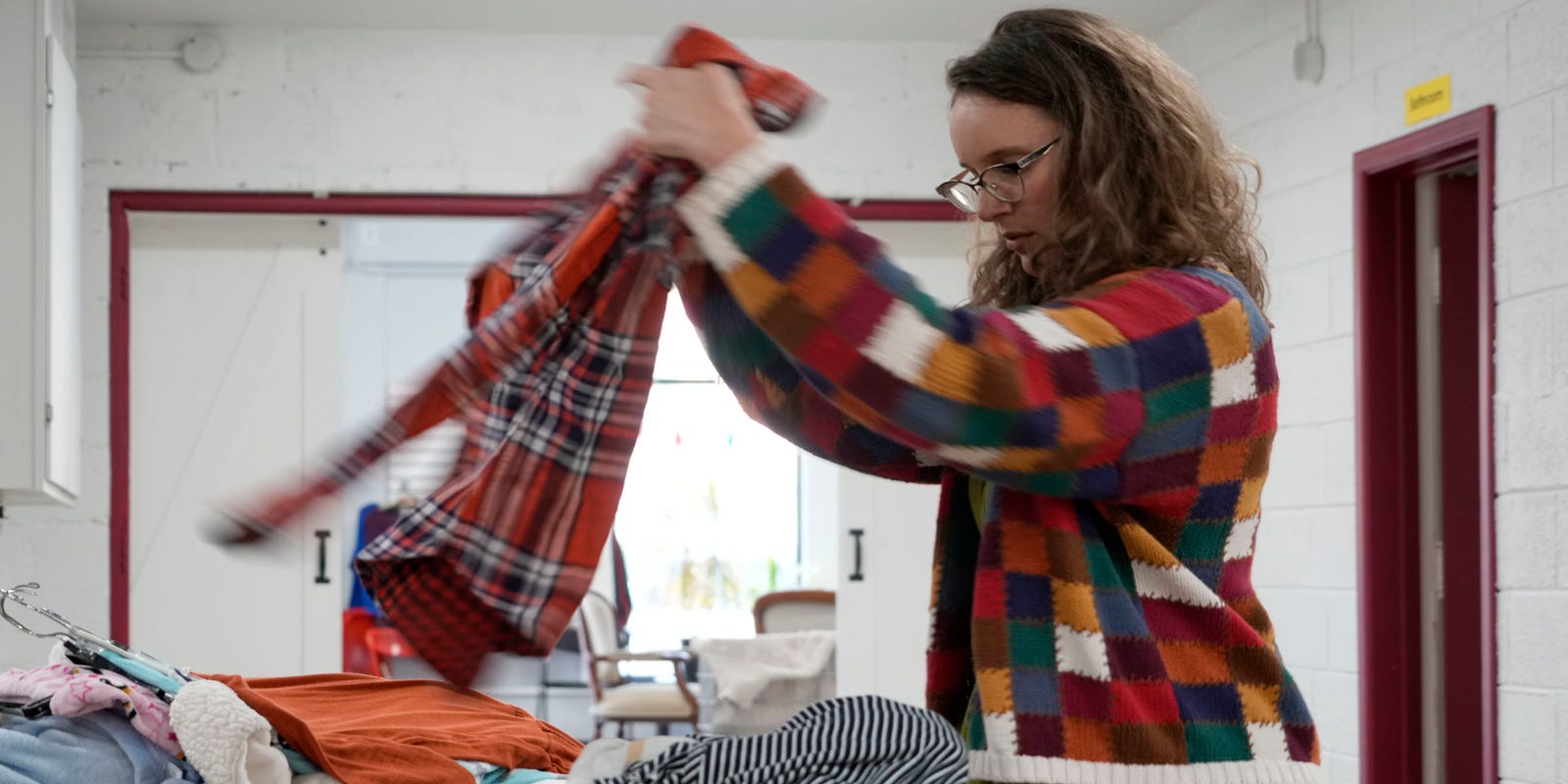Earl Graham Jr. has a fresh start in life.
He’s been sober for five months. He’s reconnecting with his wife and children. And he just started a new job working night security.
He wanted to look the part.
So, he went shopping for clothes at Father Gene’s Help Center. The West Allis thrift shop has provided free clothing for those in need for 50 years. Recent changes to the center — including increasing its retail space and modifying store operations — allow it to serve more people and families.
Individuals can shop for various donated items, from jeans and T-shirts to more professional attire like men’s suits, dresses, and shoes. The shop also has a selection of infant and toddler apparel.
On this day, Graham perused the aisles, picking up a pair of black Stacey Adams work boots, black cargo pants to match his security uniform shirts, and a few dress shirts. For someone who’s starting over, they’re essential.
“I need work pants for work. Socks. Undergarments. I need all of that,” said Graham, 42, who was told about Father Gene’s from housemates at the sober living treatment facility where he lives. “I didn’t have the money … so this is perfect. It’s a blessing.”
Father Gene’s mission is to provide dignity through free clothing
Father Gene’s Help Center isn’t a typical secondhand shop. With wide aisles, display cases, neatly folded clothes, and an airy atmosphere, the shop at 5919 W. National Ave. presents like a trendy thrift boutique fn Wauwatosa or even Milwaukee’s Third Ward.
The inviting décor is intentional —to give clients, who often come from challenging circumstances, a dignified shopping experience. Community members and local businesses donate used and new clothing offered at the thrift shop, which opened in 1969.
“Our mission is to provide dignity through free clothing. It is not about the clothes. It is about how people feel and the shopping experience,” said Jessica Luebbering, the center’s executive director. “So, how it’s arranged is important.”
Clothes are arranged by size and color as well as by gender and age for infants and teens. Rainbowing the items, Luebbering said, creates visual cohesion. All the things are displayed on racks, shelves, or hangers. Merchandise is accessorized and styled to offer suggestions on putting together an outfit.
“When people are checking out, we take the time to fold and count the items,” she said.
The shop even offers clients coffee or water. Those creature comforts are found in tony boutiques for high-end shoppers. Individuals coming to Father Gene’s should be treated no differently.
“It’s that little bit of extra touch that makes you feel like you are welcomed in a place,” Luebbering said, adding people often mistake the center for a retail shop.
That says the center is doing something right.
“We want to be more on the lines like Francesca’s or Anthropology or at least Plato’s Closet,” she said. “We are an upscale thrift store … but don’t sell anything.”
The need for clothing assistance is still great.
In March, it converted a storage area into more floor space, doubling the shop’s size to 4,000 square feet. This allowed the shop to display its entire inventory.
The shop eliminated scheduled shopping appointments. Instead, clients can shop every 90 days or four times a year at times convenient for them. The goal, Luebbering said, is not to create a dependency but assistance when needed.
And in 2019, the center shifted from its long practice of prepacked orders. Staff would pick clothing from a list of items and sizes clients wanted. Luebbering said the course wasn’t efficient, and clients didn’t use half of the items chosen.
That option is still available for those who can’t shop in person. But clients can shop for themselves, a spouse, a partner, or children under age 18 for whom they’re primary caregivers.
Clients are allowed a certain number of items each visit but can choose clothing that fits their style, taste, and needs. ILuebbering said it’s essential for people to choose clothes that express their personality and empower them.
“Style is so individual,” she said. “When you wear something you feel good in, your posture changes. You stand taller, and you carry yourself differently. We want people to take home useful things they are excited to wear.”
Since the expansion, the shop has seen a steady increase in clients. Last year, Father Gene’s served more than 7,000 clients, distributing nearly 155,000 items. In October alone, the center served more than 2,000 clients and distributed more than 26,000 articles of clothing.
But the need for clothing assistance is still great, specifically for winter coats, plus-size clothing, men’s clothing, new socks, and undergarments, including bras.
There’s more than just a social impact to what Father Gene’s provides, but an environmental one. Luebbering noted giving old clothes new life keeps them out of landfills.
Father Gene sees clothing as social justice.
Clothing isn’t often associated with the term “social justice.” But when people are housing-insecure, they can’t take all their items with them when that housing changes suddenly, Luebbering said.
People take a closet full of clothing for granted. But being dressed in attire that makes one feel comfortable allows that person to show up in the world in the best version of themselves.
“Clothing is one piece that helps them do that,” Luebbering said. “While it may not seem like a tangible social justice aspect like housing, for example, it is a tool that helps them show up to that meeting, or present themselves to a landlord, to a job interview and that they feel good and can do those things.”
The center partner partners with the community and social agencies to service their clients’ clothing needs.
a Mullins’s nonprofit, Kant Make Up Inc., is one of them. Her organization serves pregnant women, citizens returning from incarceration, and those experiencing homelessness. She said clothing is the most significant barrier for many of her clients, especially families with small children.
“They just don’t have the income for it,” Mullins said.
Having decent clothing affects youth the most. Bullying in school over what kids wear affects them socially and emotionally, she said.
“A lot of it has to do with confidence and being prepared for the weather,” Mullins said. “And with the kids, it is more anti-bullying because they don’t have (the latest styles), and it does have to do with the self-esteem as well.”
Father Gene’s, she added, is a better option than other big-name thrift stores run by social service agencies since the clothes are accessible here.
“It makes a difference,” Mullins said.
A family goes to Father Gene’s to prepare for their first winter here
The Mesa family was also shopping the same day as Earl Graham Jr., looking for winter gear. It’s the first Wisconsin winter for the family, which came to Milwaukee about five months ago.
Andrea Mesa, 28, needed shoes and gloves for her children, 1-year-old Liam and 6-year-old Juan Diego. A social worker at her son’s elementary school told her about the shop.
The center, Mesa said through an interpreter, is important because the family doesn’t have much money for winter clothes.
Also shopping was John W., 66, who asked Tonly to use the initial of his last name. He, too, was seeking clothes for a new start in life.
John described himself as just a man down on his luck, nearly losing everything to a gambling addiction. He moved to Milwaukee from Arizona for a new start and landed a job as a produce clerk at a big-box grocery store. He picked up some shirts, jeans, and a pair of Stacey Adams shoes.
If third, he’d have to go to Goodwill. He said a $7 if this shop wasn’t here5 voucher from that store went quickly.
“If this weren’t here, I wouldn’t have winter shoes,” John said. “I wouldn’t have nothing.”
How you can help: Donations of gently used and cleaned clothes can be dropped off at Father Gene’s Help Center, 5919 W. National Ave., West Allis, WI 53214, or visit www.FatherGenesHelp.org to contribute financially.
Critical need items: Winter coats, shoes and boots, children’s clothing sizes 3T-18, new socks, and new undergarments.

